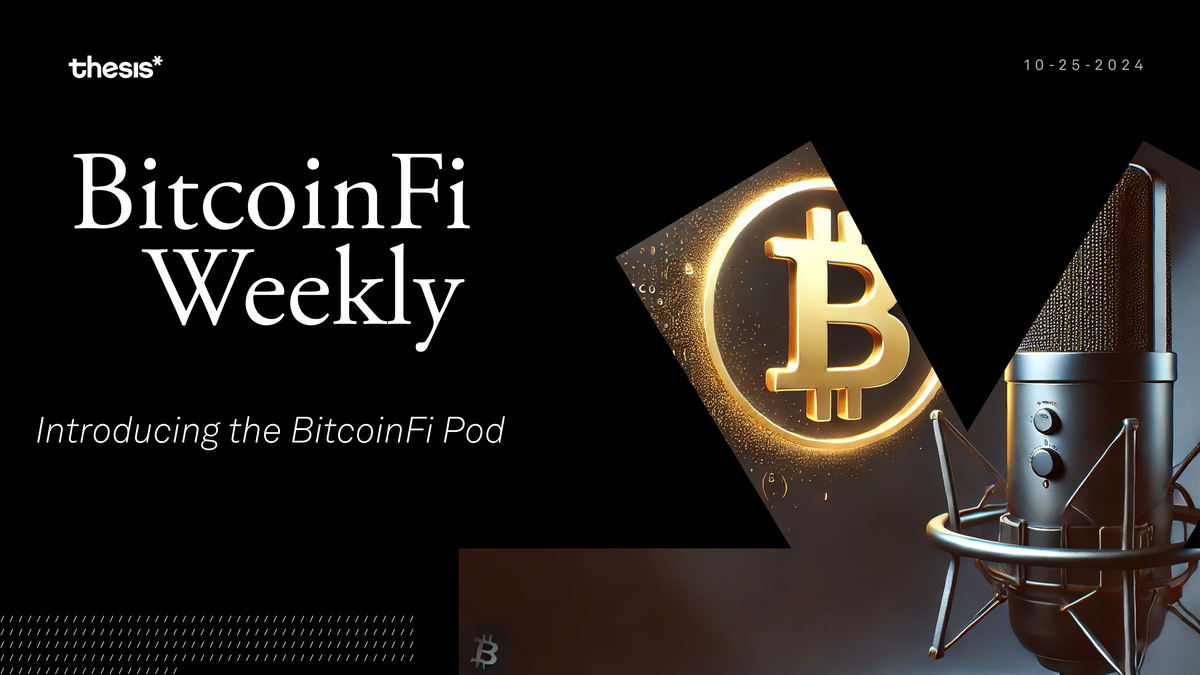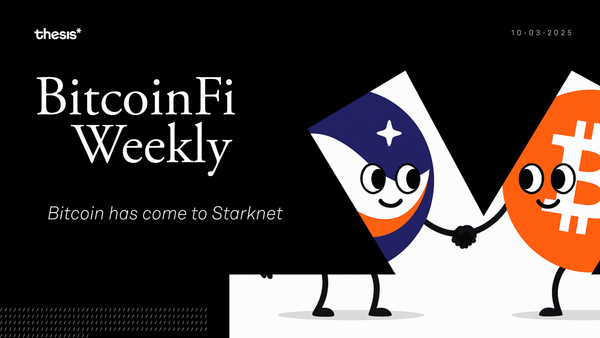Introducing the BitcoinFi Pod
The BitcoinFi Pod takes you beyond price action to explore Bitcoin's evolution from digital gold to a global financial playground. Join hosts Yogi and Jan as they dive deep into institutional adoption, Layer 2s, and the cultural shift transforming Bitcoin's ecosystem.

Welcome to BitcoinFi Weekly. We cover where people use their BTC and what is changing in the Bitcoin world.
Welcome back. A curious transformation is taking place—one that would have seemed impossible just months ago. This week, we’re introducing our new podcast, the BitcoinFi Pod, which spotlights voices on Bitcoin’s transformation. We’ll also examine Proof Aggregation for scaling zero-knowledge applications on Bitcoin, and explore Native, a protocol aiming to bring programmable interoperability to Bitcoin without bridges. As Bitcoin ETFs gain momentum, we analyze who’s holding them and why (spoiler: it's not who you'd expect). Finally, we look at how Cardano is integrating with BitcoinOS through the Grail Bridge.
Let’s begin.
Here’s this week’s rundown:
🎙 Feature Piece: Introducing the BitcoinFi Pod
🔗 Proof Aggregation for ZK on Bitcoin
💻 Native - Programmable and Interoperable Bitcoin
📊 Who are Bitcoin ETF Holders?
🌉 BitcoinOS Brings Bitcoin to Cardano
Feature Piece: Introducing the BitcoinFi Pod
The crypto industry is no stranger to podcasts, most chasing trending topics or price action. The BitcoinFi podcast takes a different approach, focusing on how Bitcoin is evolving from a simple store of value into a thriving economic playground.
Hosted by Yogi, director of BD & strategy at Thesis, and Jan, chief strategy officer at Xverse, the podcast explores the ongoing Bitcoin Renaissance. Our hosts discuss how this fundamental shift is characterized by unprecedented institutional adoption, the abundance of Layer 2 building on Bitcoin, a cultural move beyond the "digital gold" narrative toward productive financial applications, and an explosion of innovation in NFTs and DeFi products, among other topics.
So far, three episodes have aired. Not to worry if you’ve missed them, The BitcoinFi Weekly newsletter will have you covered. Here’s the TLDR:
In the first episode, Yogi deep dives into Bitcoin's financial abstraction layers with Jing, from the Solv Protocol, exploring how Bitcoin can interact with DeFi without losing its core identity. Jing emphasizes that Solv's success stems from addressing the fragmentation problem in Bitcoin assets, creating bridges between different wrapped Bitcoin versions, and making them interoperable across chains. Jing also shared that institutional users, particularly those accustomed to centralized custody solutions, are becoming more comfortable with DeFi through Solv's infrastructure. This represents a big shift from the traditional "hodl" mentality, as users now have multiple options for generating yield on their Bitcoin, from lower-risk staking opportunities to more sophisticated strategies. Perhaps most notably, Jing highlights how the next phase of BitcoinFi will focus on sustainable, real-yield opportunities rather than token emissions and points programs, signaling the ecosystem's maturation beyond early speculation-driven models.
By the second episode, the discussion with Maxime from Draper Associates shifted towards institutional adoption and venture capital’s role in Bitcoin. Maxim offers a unique perspective on Bitcoin, drawing from his journey from traditional finance through early DeFi to his current role managing crypto investments for the $1 billion fund. Traditional venture capital's view of Bitcoin is fundamentally shifting - moving beyond simple exchange investments to comprehensive Bitcoin-focused theses. Maxim emphasizes Draper's approach of looking for transformative technologies with 5-10 year horizons rather than quick liquidity events common in crypto venture funding. This long-term perspective has led to their support of Bitcoin infrastructure projects since 2013, including early investments in Coinbase. The discussion explores the newly launched BitcoinFi accelerator, a collaboration with Thesis, which aims to invest in early-stage Bitcoin companies building consumer applications rather than more infrastructure. Maxim poignantly notes that when there's healthy disagreement about Bitcoin's direction - as seen in current debates about ordinals and Layer 2 approaches - it often signals the biggest opportunities for innovation and investment. The main takeaway of this episode: while previous crypto cycles focused on infrastructure plays, the current wave emphasizes user experience, consumer applications, and mainstream adoption.
Finally, the conversation with Zedd, co-founder of Magic Eden, offers invaluable insights into how one of crypto's largest NFT marketplaces pivoted to embrace Bitcoin's renaissance. Despite having just gone through layoffs in late 2022, Magic Eden boldly decided to dive into Bitcoin ordinals in early 2023, driven by clear user demand, despite it being highly friction-filled. Zedd recalls how watching users trade NFTs through spreadsheets in Discord channels signaled genuine interest, leading to Magic Eden's development of user-friendly tools for Bitcoin-based products. Magic Eden’s vision extends beyond just NFTs - they aim to create what Zedd calls a "Bitcoin playground," where users can seamlessly trade between different types of assets across chains. This aligns with their broader "all chains, all assets" strategy, which includes developing embedded wallets and fiat on-ramps to make the Bitcoin ecosystem more accessible to mainstream users. The discussion illuminates how Magic Eden's journey mirrors Bitcoin's broader evolution - from their initial skepticism about ordinals' viability given Bitcoin's limited programmability to their current position at the forefront of building consumer-friendly infrastructure for Bitcoin's expanding use cases.
If you want to dive deeper into the Bitcoin Renaissance, be sure to subscribe here for more.
BitcoinFi Updates
Proof Aggregation for ZK on Bitcoin
Zero-knowledge proof applications are slowly but steadily reaching a point of inflection with their integration on Bitcoin, with proof aggregation emerging as a potential forward for scalability. The current approach of verifying individual ZK proofs on Bitcoin's base layer faces significant limitations due to high costs, slow processing times, and competition for limited block space. LayerEdge’s proof aggregation offers a solution by combining multiple proofs into a single verification, potentially reducing costs by up to 99% while maintaining Bitcoin's security guarantees. While other L1s have often compromised security for performance, Bitcoin's approach through ZK proof aggregation maintains its robust security model while enabling more efficient verification of off-chain computations. Through Proof Aggregation, LayerEdge enables vast computational power for applications beyond financial transactions, extending into AI, IoT, and DePIN networks. By bridging Bitcoin’s security with emerging technologies, LayerEdge repositions Bitcoin as a foundational layer for decentralized, verifiable trust
Native - Programmable and Interoperable Bitcoin
Native is introducing what they call the first Bitcoin Application Layer built on their “Zero Trust Architecture”, aiming to address Bitcoin's limited scripting capabilities without compromising its security model. At its core, the platform leverages dWallet Network to enable native Bitcoin interoperability without wrapping or bridging, while introducing programmable smart contracts through CosmWasm integration. Native's distinctive feature is its BLISS (Bitcoin Liquidity & Interoperability Security Stack) system, which aims to unify Bitcoin's growing ecosystem of Layer 2 solutions and provide security services for validity proofs.
Native positions itself as neither a traditional Layer 1 nor Layer 2, but rather a Byzantine fault-tolerant network that provides Turing-complete programmability for Bitcoin. However, skepticism remains. Critics argue that labeling Native as "Zero Trust" may be misleading, as MPC requires some level of trust in the network operators. Additionally, while Native’s dWallet basis promotes bridgeless interoperability, some view it as a rebranding of trusted third-party involvement rather than a fully decentralized solution. There is ongoing debate over whether the protocol actually eliminates trust or minimizes it by distributing responsibility across MPC participants. Additionally, the ecosystem's reliance on MPC for complex functions like multi-signature and custody has led to questions about security, centralization risks, and cost efficiency.
Who are Bitcoin ETF Holders?
Initial data from Bitcoin ETF highlights the limited participation of traditional institutional investors and investment advisors, who hold less than 1% of new Spot Bitcoin ETFs, contrasting their larger holdings in traditional non-equity ETFs like $GLD and $TLT. This data suggests that the investor base for Bitcoin ETFs skews towards retail investors and high-frequency traders rather than major financial institutions or wealth managers.
Retail investors and hedge funds account for an average trade size of just $14,000 - less than half the typical amount for comparable ETFs. Notable exceptions include some smaller firms taking substantial positions, such as Pittsburgh's Quattro Advisors with 468,200 shares of BlackRock's IBIT, and Hong Kong-based managers like Yong Rong and Ovata Capital making significant allocations across multiple Bitcoin ETFs. The Wisconsin state pension fund's $162 million investment stands as a rare example of traditional institutional involvement. This retail-heavy ownership structure has raised concerns about potential volatility, as these investors historically demonstrate less patience during market downturns and typically chase momentum rather than maintaining long-term positions.
For a full list of Bitcoin ETF 13F filings check out this page.
BitcoinOS Brings Bitcoin to Cardano
Cardano has integrated the BitcoinOS (BOS) Grail Bridge. This makes Cardano the second major Layer 1 chain, after Bitcoin itself, to connect to BOS, potentially expanding its ecosystem by linking it with Bitcoin's liquidity. The integration aims to bridge the longstanding divide between Bitcoin's dominant market position ($1.33 trillion market cap, representing 59% of total crypto value) and its limited programmability. Through EMURGO, one of Cardano's founding entities, the implementation will enable “trustless” bridging of Bitcoin assets to Cardano's network.
The Grail Bridge uses zero-knowledge proofs, following BitcoinOS's milestone achievement as the first platform to verify a ZK Proof on Bitcoin in July 2024. This follows previous BitcoinOS integrations with significant Bitcoin DeFi players, including Sovryn, Merlin Chain, and B² Network. This partnership is particularly noteworthy in its roadmap to create a trustless bridge between Bitcoin's substantial capital base and Cardano’s established ecosystem, setting a precedent for how other Layer 1 blockchains might approach Bitcoin integration in the future.
Closing Thoughts
As winter's first frost begins to eek in, we find ourselves caught between the familiar warmth of old financial traditions and the fierce winds of Bitcoin innovation, like all generations before us who have witnessed great change. The institutional investors, much like the nobility of old, watch cautiously from their fortified estates, while the common people – those brave souls who trade from their phones and laptops – embrace this revolution with the same fervor that has always marked humanity's greatest transformations. Each protocol, each bridge, each proof builds upon the last, like Humpty Dumpty’s stone wall, constructed not by grand design but by necessity. To stay on top of everything Bitcoin, tune into the BitcoinFi Pod for a deeper dive into Bitcoin’s ongoing transformation—from scaling and Layer 2 updates to fresh institutional insights.
Thank you for tuning in to this week’s BitcoinFi Weekly. See you next week.
If there's a topic you’d like us to cover or have questions, reach out at [email protected].
Learn more about Mezo at the following channels:
👾 Discord: https://discord.mezo.org
🕊 X: https://twitter.com/MezoNetwork
🖥 Website: https://mezo.org
🏦 Deposit Portal: https://mezo.org/hodl
ℹ️ Docs: https://info.mezo.org





